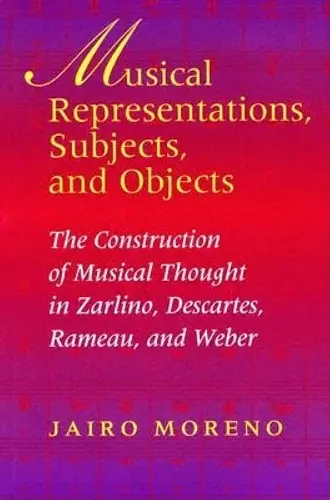Musical Representations, Subjects, and Objects
The Construction of Musical Thought in Zarlino, Descartes, Rameau, and Weber
Format:Hardback
Publisher:Indiana University Press
Published:21st Dec '04
Currently unavailable, and unfortunately no date known when it will be back

A provocative application of Foucault's ideas to music theory.
Presents an application of Foucault's ideas to music theory.
Jairo Moreno adapts the methodologies and nomenclature of Foucault's "archaeology of knowledge" and applies it through individual case studies to the theoretical writings of Zarlino, Descartes, Rameau, and Weber. His conclusion summarizes the conditions—musical, philosophical, and historical—that "make a certain form of thought about music necessary and possible at the time it emerges."
Musical Meaning and Interpretation—Robert S. Hatten, editor
[An] ambitious and impressive attempt to bring the whole weight of the Western epistemological tradition—stretching back to Aristotle and Plato—to bear on music theoretical texts, to bring them back into the fold of Western thought, and to lend these classic theoretical texts a new relevance.47.2 2003
* Journal of Music Theory *In this compelling and engaging study, Moreno (Duke Univ.) explores the notion that the developments of music theory are part and parcel of the philosophical conditions of a specific historical period, and that they can act as representations of a model of thinking outside the scope of aesthetic concern. Indeed, the author outlines the chronological relationships between the function of music theory, the act of music composition, and the production of music itself. Particularly interesting is Moreno's discussion of music theory's journey into and out of the realm of science and the related study of nature, which itself takes on a philosophical perspective. Replete with comparative examples from numerous music theory treatises and their contemporary philosophical discourses and religious thought, the author connects the various fields to one another under the common umbrella of the zeitgeist of each particular era. This rigorous text will be accessible only to scholars of music theory and philosophy, but it will become a milestone in the field, opening up a new area for comparative research. Summing Up: Essential. Graduate and research collections only. —J. Rubin, University of MinnesotaOctober 2005
-- Duluth * ChoiISBN: 9780253344571
Dimensions: unknown
Weight: unknown
256 pages